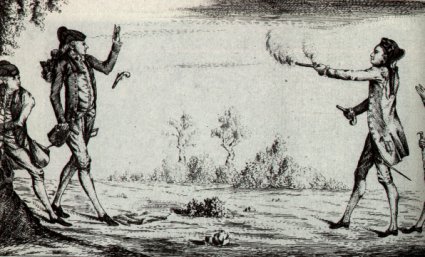
Captain Edward Clark, imprisoned for Dueling
Listen well, visitors, for this is one of the few members of the elite to whom you will listen today. Captain Clark has been convicted of murder. He will tell you the details...
"On the 11th of March, 1750, I called on Captain Innes at about eight o'clock in the morning, and insisted that we fight with sword and pistol the next morning in Hyde-Park. You see, he had used me very ill. He called me a very great rascal, and I could not have my name slandered so. On March the 12th, in Hyde-Park, Innes and I took up our pistols. At a distance of about four yards away, I turned and shot Innes. It was a fair duel, conducted in a gentlemanly manner. Captain Innes died that night, but forgave me prior. When the guard asked Innes what he believed should be done with me, he said I should be released, as I behaved like a man of honor, though he believed I fired too soon.
"I am here at Newgate because the jury believed they could do nothing but find me guilty, according to the law. Many people spoke at my trial, proving me a worthy, good-natured man. This, combined with Innes's forgiveness and my earnest apologies for the act, led the jury to beg the Court to recommend me for his Majesty's mercy.
"My execution has been postponed, and I am here at Newgate to await word about my possible pardon [1].

In the eighteenth century, the social elite does not commit most capital crimes. Dueling is the one crime that is recognized by the Bloody Code and is mainly practiced by the elite [2]. In theory, the law does not distinguish the premeditation of a duel from the premeditation of murder, and therefore should punish the duelist like a murderer. In practice, most juries will acquit duelists based on "the plea that dueling [is] the proper way for 'gentlemen' to resolve their disputes" [3]. The social status of the upper class enables them to plead for their "honor," thereby justifying the practice to the courts. Because of this, men such as Captain Clark (even though he was convicted of murder) are able to escape the gallows by a pardon from the king [4]. In defense of dueling, some aristocrats claim the outcome of the duel is an act of God. "God, it was alleged, gave the victory to the just, not the most skillful" [5]. Through this belief, one can claim that the duel is an act of punishment controlled directly by God, therefore surpassing the need for a trial. The person who wins the duel would not be a criminal. Instead, he would be quite holy for carrying out God's will and undeserving of punishment, no matter what the laws state.
Dueling is evidence of the injustices of English criminal law in the 18th century. A man of lower social status is less likely to actually participate in an official duel, so he cannot use the excuse of honor to plead his innocence. It is also less likely that so many people will speak up for his worthy character, so he will still end up hanging for his crime.